
This article introduces to you "Analysis of PHP8 underlying kernel source code - array (4)". It has certain reference value. Friends in need can refer to it. I hope it will be helpful to everyone.
Recommended related articles: " Analysis of PHP8 underlying kernel source code - array (1)" " Analysis of PHP8 underlying kernel source code - array (2)" " Parsing PHP8 underlying kernel source code - array (3)》
In Runningprocess, we already know that the code needs to go through lexical analysis, syntax analysis, compilation and execution of four major steps
PHP 8 will create an array constant during the compilation phase (when the AST abstract syntax tree is compiled into opcode). This array constant, like numeric constants and string constants, is determined and allocated memory during the compilation phase. So the initialization of the array happens during the compilation phase.
PHP’s array initialization code part is as follows
//如果开启zend_debug #if !ZEND_DEBUG && defined(HAVE_BUILTIN_CONSTANT_P) # define zend_new_array(size) \ (__builtin_constant_p(size) ? \ ((((uint32_t)(size)) <= HT_MIN_SIZE) ? \ _zend_new_array_0() \ //走 _zend_new_array_0 : \ _zend_new_array((size)) \ ) \ : \ _zend_new_array((size)) \ ) #else //没有开启 也就是一般模式 走 _zend_new_array # define zend_new_array(size) \ _zend_new_array(size) #endif ZEND_API void ZEND_FASTCALL _zend_hash_init(HashTable *ht, uint32_t nSize, dtor_func_t pDestructor, zend_bool persistent) { _zend_hash_init_int(ht, nSize, pDestructor, persistent); } ZEND_API HashTable* ZEND_FASTCALL _zend_new_array_0(void) { //分配内存空间 HashTable *ht = emalloc(sizeof(HashTable)); //初始化 _zend_hash_init_int(ht, HT_MIN_SIZE, ZVAL_PTR_DTOR, 0); return ht; } //初始化方法 static zend_always_inline void _zend_hash_init_int(HashTable *ht, uint32_t nSize, dtor_func_t pDestructor, zend_bool persistent) { GC_SET_REFCOUNT(ht, 1); GC_TYPE_INFO(ht) = GC_ARRAY | (persistent ? ((GC_PERSISTENT|GC_NOT_COLLECTABLE) << GC_FLAGS_SHIFT) : 0); HT_FLAGS(ht) = HASH_FLAG_UNINITIALIZED; ht->nTableMask = HT_MIN_MASK; HT_SET_DATA_ADDR(ht, &uninitialized_bucket); ht->nNumUsed = 0; ht->nNumOfElements = 0; ht->nInternalPointer = 0; ht->nNextFreeElement = ZEND_LONG_MIN; ht->pDestructor = pDestructor; ht->nTableSize = zend_hash_check_size(nSize); } //初始化 bucket 也就是 ardata ZEND_API void ZEND_FASTCALL zend_hash_real_init(HashTable *ht, zend_bool packed) { IS_CONSISTENT(ht); HT_ASSERT_RC1(ht); //调用 zend_hash_real_init_ex方法 zend_hash_real_init_ex(ht, packed); } //zend_hash_real_init_ex方法 static zend_always_inline void zend_hash_real_init_ex(HashTable *ht, bool packed) { HT_ASSERT_RC1(ht); ZEND_ASSERT(HT_FLAGS(ht) & HASH_FLAG_UNINITIALIZED); if (packed) { //如果是packed_array zend_hash_real_init_packed_ex(ht); } else { //如果是 hash_array zend_hash_real_init_mixed_ex(ht); } } //paced_array 初始化bucket 的代码 static zend_always_inline void zend_hash_real_init_packed_ex(HashTable *ht) { void *data; if (UNEXPECTED(GC_FLAGS(ht) & IS_ARRAY_PERSISTENT)) { data = pemalloc(HT_SIZE_EX(ht->nTableSize, HT_MIN_MASK), 1); } else if (EXPECTED(ht->nTableSize == HT_MIN_SIZE)) { data = emalloc(HT_SIZE_EX(HT_MIN_SIZE, HT_MIN_MASK)); } else { data = emalloc(HT_SIZE_EX(ht->nTableSize, HT_MIN_MASK)); } HT_SET_DATA_ADDR(ht, data); /* Don't overwrite iterator count. */ ht->u.v.flags = HASH_FLAG_PACKED | HASH_FLAG_STATIC_KEYS; HT_HASH_RESET_PACKED(ht); } //hash_array 初始化bucket的代码 static zend_always_inline void zend_hash_real_init_mixed_ex(HashTable *ht) { void *data; uint32_t nSize = ht->nTableSize; if (UNEXPECTED(GC_FLAGS(ht) & IS_ARRAY_PERSISTENT)) { data = pemalloc(HT_SIZE_EX(nSize, HT_SIZE_TO_MASK(nSize)), 1); } else if (EXPECTED(nSize == HT_MIN_SIZE)) { data = emalloc(HT_SIZE_EX(HT_MIN_SIZE, HT_SIZE_TO_MASK(HT_MIN_SIZE))); ht->nTableMask = HT_SIZE_TO_MASK(HT_MIN_SIZE); HT_SET_DATA_ADDR(ht, data); /* Don't overwrite iterator count. */ ht->u.v.flags = HASH_FLAG_STATIC_KEYS; #ifdef __SSE2__ do { __m128i xmm0 = _mm_setzero_si128(); xmm0 = _mm_cmpeq_epi8(xmm0, xmm0); _mm_storeu_si128((__m128i*)&HT_HASH_EX(data, 0), xmm0); _mm_storeu_si128((__m128i*)&HT_HASH_EX(data, 4), xmm0); _mm_storeu_si128((__m128i*)&HT_HASH_EX(data, 8), xmm0); _mm_storeu_si128((__m128i*)&HT_HASH_EX(data, 12), xmm0); } while (0); #elif defined(__aarch64__) do { int32x4_t t = vdupq_n_s32(-1); vst1q_s32((int32_t*)&HT_HASH_EX(data, 0), t); vst1q_s32((int32_t*)&HT_HASH_EX(data, 4), t); vst1q_s32((int32_t*)&HT_HASH_EX(data, 8), t); vst1q_s32((int32_t*)&HT_HASH_EX(data, 12), t); } while (0); #else HT_HASH_EX(data, 0) = -1; HT_HASH_EX(data, 1) = -1; HT_HASH_EX(data, 2) = -1; HT_HASH_EX(data, 3) = -1; HT_HASH_EX(data, 4) = -1; HT_HASH_EX(data, 5) = -1; HT_HASH_EX(data, 6) = -1; HT_HASH_EX(data, 7) = -1; HT_HASH_EX(data, 8) = -1; HT_HASH_EX(data, 9) = -1; HT_HASH_EX(data, 10) = -1; HT_HASH_EX(data, 11) = -1; HT_HASH_EX(data, 12) = -1; HT_HASH_EX(data, 13) = -1; HT_HASH_EX(data, 14) = -1; HT_HASH_EX(data, 15) = -1; #endif return; } else { data = emalloc(HT_SIZE_EX(nSize, HT_SIZE_TO_MASK(nSize))); } ht->nTableMask = HT_SIZE_TO_MASK(nSize); HT_SET_DATA_ADDR(ht, data); HT_FLAGS(ht) = HASH_FLAG_STATIC_KEYS; HT_HASH_RESET(ht); } //数组赋值和更新值 static zend_always_inline zval *_zend_hash_index_add_or_update_i(HashTable *ht, zend_ulong h, zval *pData, uint32_t flag) { uint32_t nIndex; uint32_t idx; Bucket *p; IS_CONSISTENT(ht); HT_ASSERT_RC1(ht); if ((flag & HASH_ADD_NEXT) && h == ZEND_LONG_MIN) { h = 0; } if (HT_FLAGS(ht) & HASH_FLAG_PACKED) { if (h < ht->nNumUsed) { p = ht->arData + h; if (Z_TYPE(p->val) != IS_UNDEF) { replace: if (flag & HASH_ADD) { return NULL; } if (ht->pDestructor) { ht->pDestructor(&p->val); } ZVAL_COPY_VALUE(&p->val, pData); return &p->val; } else { /* we have to keep the order :( */ goto convert_to_hash; } } else if (EXPECTED(h < ht->nTableSize)) { add_to_packed: p = ht->arData + h; /* incremental initialization of empty Buckets */ if ((flag & (HASH_ADD_NEW|HASH_ADD_NEXT)) != (HASH_ADD_NEW|HASH_ADD_NEXT)) { if (h > ht->nNumUsed) { Bucket *q = ht->arData + ht->nNumUsed; while (q != p) { ZVAL_UNDEF(&q->val); q++; } } } ht->nNextFreeElement = ht->nNumUsed = h + 1; goto add; } else if ((h >> 1) < ht->nTableSize && (ht->nTableSize >> 1) < ht->nNumOfElements) { zend_hash_packed_grow(ht); goto add_to_packed; } else { if (ht->nNumUsed >= ht->nTableSize) { ht->nTableSize += ht->nTableSize; } convert_to_hash: zend_hash_packed_to_hash(ht); } } else if (HT_FLAGS(ht) & HASH_FLAG_UNINITIALIZED) { if (h < ht->nTableSize) { zend_hash_real_init_packed_ex(ht); goto add_to_packed; } zend_hash_real_init_mixed(ht); } else { if ((flag & HASH_ADD_NEW) == 0 || ZEND_DEBUG) { p = zend_hash_index_find_bucket(ht, h); if (p) { ZEND_ASSERT((flag & HASH_ADD_NEW) == 0); goto replace; } } ZEND_HASH_IF_FULL_DO_RESIZE(ht);/* If the Hash table is full, resize it */ } idx = ht->nNumUsed++; nIndex = h | ht->nTableMask; p = ht->arData + idx; Z_NEXT(p->val) = HT_HASH(ht, nIndex); HT_HASH(ht, nIndex) = HT_IDX_TO_HASH(idx); if ((zend_long)h >= ht->nNextFreeElement) { ht->nNextFreeElement = (zend_long)h < ZEND_LONG_MAX ? h + 1 : ZEND_LONG_MAX; } add: ht->nNumOfElements++; p->h = h; p->key = NULL; ZVAL_COPY_VALUE(&p->val, pData); return &p->val; }
_zend_hash_init_int The flow chart is as follows
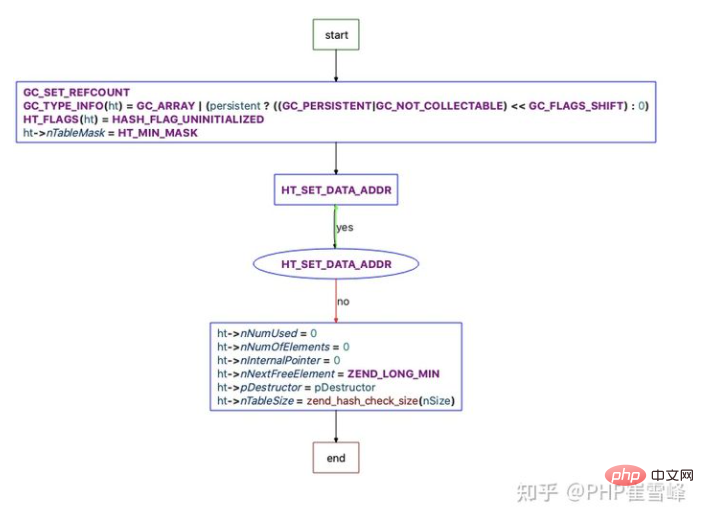
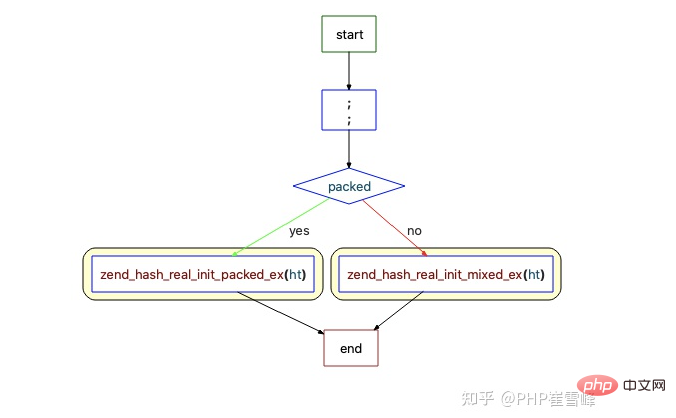 ##zend_hash_real_init_ex method flow chart (initializing bucket)
##zend_hash_real_init_ex method flow chart (initializing bucket)
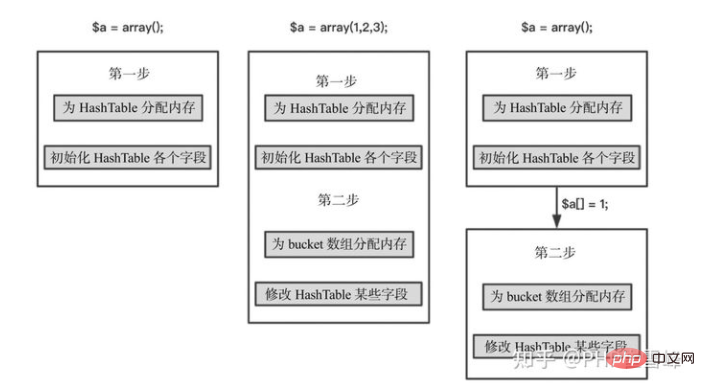
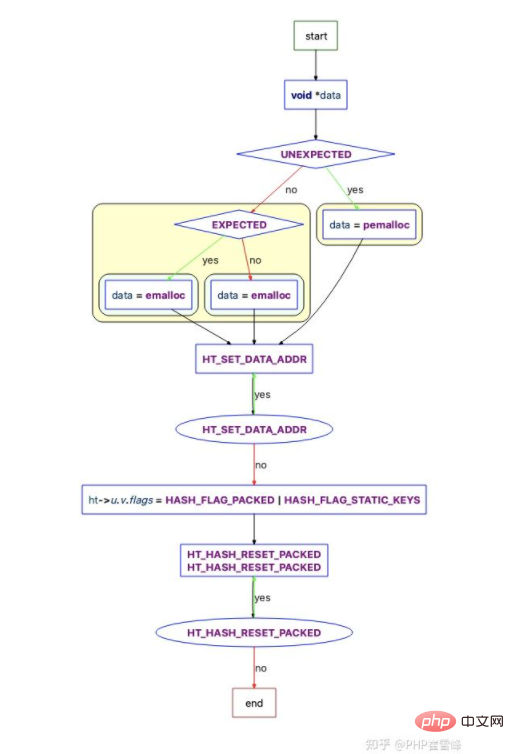
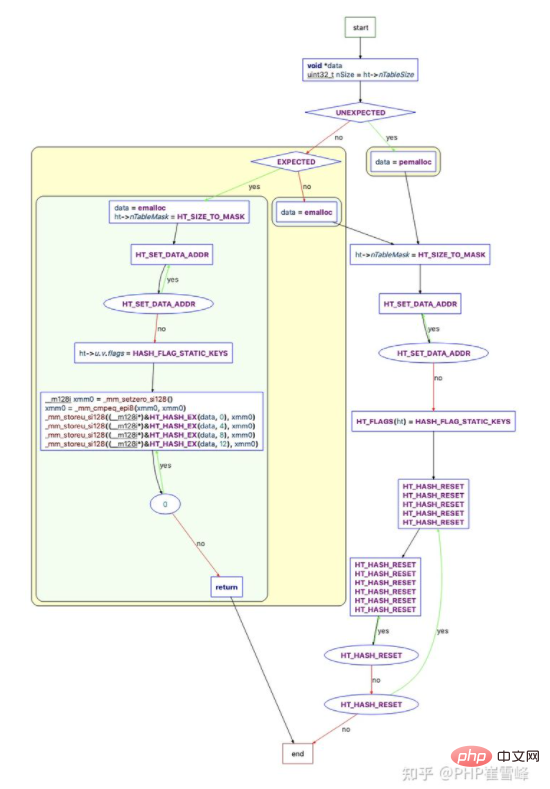
The above is the detailed content of Parsing PHP8 underlying kernel source code - array (4). For more information, please follow other related articles on the PHP Chinese website!
 What are the definitions of arrays?
What are the definitions of arrays? js string to array
js string to array Array initialization method
Array initialization method c array initialization method
c array initialization method How to find the maximum and minimum value of array elements in Java
How to find the maximum and minimum value of array elements in Java How to remove the first few elements of an array in php
How to remove the first few elements of an array in php Summary of java basic knowledge
Summary of java basic knowledge Zero-based Java self-study tutorial
Zero-based Java self-study tutorial



